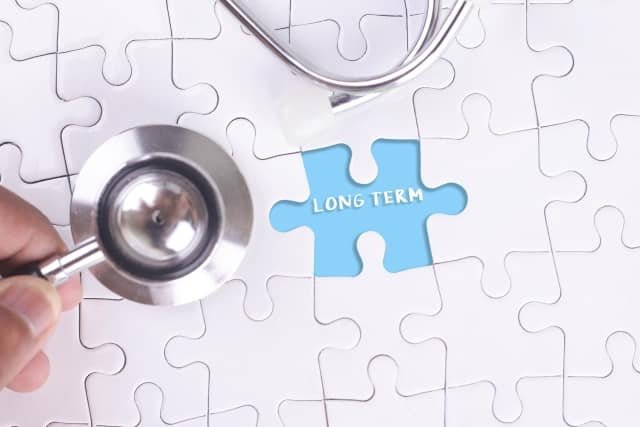
If you were injured or you developed an illness at work and the doctors don’t expect you to recover anytime soon, you may be a candidate for long-term disability. This coverage is meant to take the place of your income by providing you with a portion of your regular salary while you recover (usually 60-70%). It can prevent you from draining your savings until you can return to work.
In this article, we’ll cover the basics of qualifying for long-term disability and what the requirements are.
The Requirements of Long-Term Disability
In order to take advantage of long-term disability benefits, you must first exhaust the sick leave benefits your employer provides, your short-term disability insurance, and your earned income benefits. You must also have proof from a doctor that you are disabled and unable to work.
How long you will be covered will depend on which disability plan you use. Some will cover you for two years if you are unable to work at your job and then continue coverage beyond that only if you are still found to be unable to work in any job at all.
Walking Through the Process
If you want to claim your long-term disability benefits, there are steps you must follow. This is how the process generally works.
Get an Application Form From Your Employer
If you are employed, you will need to get an application form from your employer. You can usually get one from the human resource department in your company, but it is possible that they will fail to provide you with the form. If that happens, you shouldn’t worry as you can simply visit the insurers’ website and download the form from there.
Complete the Form Promptly
Completing the form promptly means providing detailed information that might help the insurer compensate you by getting you approved quickly. Some of the essential information includes your name, your Social Insurance Number, your personal address, and the addresses and contact information of your medical providers.
Engage Your Employer
Since the policy should cover you when you sustain personal injuries as an employee, your employer must provide relevant details about you. There is a section for the employer in the application form. They should state the date you started employment, the date you sustained the injury, or the date they first became aware of your illness.
Your employer may also state the benefits you are eligible for in the other insurance policies you may be enrolled in. Essentially, the employer plays an essential role in making you qualify for your benefits.
Your Doctor’s Statement Is Vital
Before approving that you are eligible for the benefits, the insurer will need to see a statement from your doctor. The doctor should give accurate information concerning the diagnosis and any forms of treatment you received. This data will help them know how serious the condition is and the amount of compensation that may be required as a result.
Other Documents Are Also Necessary
If you have other documents that can support your claim, you shouldn’t leave them behind when submitting your request. Any documentation you have that can back up your claims can bolster your case. These documents can help the insurance company authenticate your claim.
No matter how well-documented your claim is, there is always the chance it will be denied, at least on the first try. Click here to learn more about common issues with long-term disability claims. Many claims are rejected on the first attempt, but they may go on to be accepted, especially if you have an attorney’s help.
ATTENTION READERS
We See The World From All Sides and Want YOU To Be Fully InformedIn fact, intentional disinformation is a disgraceful scourge in media today. So to assuage any possible errant incorrect information posted herein, we strongly encourage you to seek corroboration from other non-VT sources before forming an educated opinion.
About VT - Policies & Disclosures - Comment Policy



